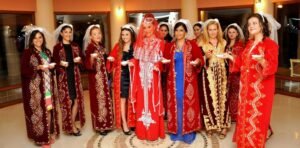Have you ever attended the wedding of two very different traditions? Even if you haven’t, have you compared them before? Although the world is home to a wide variety of cultures, there may be more similarities between the two cultures than you think. Let’s take a look at these similarities. Here are the similarities between Turkish and Buddhist weddings.
How is the process of choosing a partner ?
In Buddhist and Turkish marriages, the choice of a partner is usually carried out by the families involved. One side starts the matchmaking process. If the man and woman agree, the dating process begins. But of course, the woman or man can choose their own partner. But usually this process starts with a suggestion from family.

How do families meet? Who usually initiates this process?
Typically, the introduction and marriage proposal are expected to come from the man’s family. In Buddhist weddings, there is considerable emphasis on matching astrological signs during this process. On the other hand, in Turkish weddings, harmony between families and friendships is as important as the harmony between couples. In a Buddhist wedding, the wedding preparations begin after the signs of the zodiac match. While In Turks the wedding preparations begin after the families match.
What are the important aspects to consider when families meet each other?
Both Buddhists and Turks bring a gift when families meet for the first time. Otherwise it can be considered rude. Buddhists usually bring a bottle of wine, while Turks usually bring a type of dessert called “baklava”. During this meeting that both sides decide on the date of the engagement and wedding.

What kind of music and dances between Turkish And Buddhist Weddings?
Music, dance, and entertainment hold considerable importance on both sides. Buddhist and Turkish weddings, lively folk choreography is generally performed. Some traditional dances are exclusively performed by men, while others involve both men and women. Furthermore, musicians playing traditional instruments and singing songs are highly valued in these weddings. The music genres can vary, encompassing both traditional and different styles in various languages.
In both traditions, are the couples blessed?
In Buddhist weddings, prior to or during the ceremony, couples are blessed by a local monk dressed in orange robes, or they visit a temple. Similarly, in Turkish traditions, couples are generally blessed before the wedding by a person referred to as an “imam” or they visit a mosque. Specifically, in both cultures, these monks have a calm face and a gentle voice. This reduces the tension of the couples and makes them peaceful. Therefore, in both weddings, there are generally two parts: a religious ceremony and followed by a celebration with family and friends.


Colorful Attire and Decorations
Turkish weddings often feature vibrant attire and rich decorations. Similarly, Buddhist weddings also include colorful attire and traditional decorations. There isn’t a strict rule for attire. But on both sides, there is an aversion to black as it’s considered unlucky and not welcomed. Additionally, there aren’t any particular restrictions for guests, but they tend to avoid dressing casually. Out of respect, guests make an effort to dress as elegantly as possible.
Food and Treats at Turkish and Buddhist Weddings
Weddings in both cultures are usually celebrated with abundant meals and treats for the guests.
Importance of Guests and Invitations
Both Turkish and Buddhist weddings highlight the importance of guests. Couples from both cultures typically create an extensive guest list to celebrate their special day.
Dowry at Turkish and Buddhist Weddings
In both traditions, there is a dowry. Just like in Turkish traditions, the dowry given to the bride is prepared by the groom. The only difference is that in Turkish weddings, dowry is also given to the groom, whereas in Buddhist weddings, dowry is only given to the bride.

